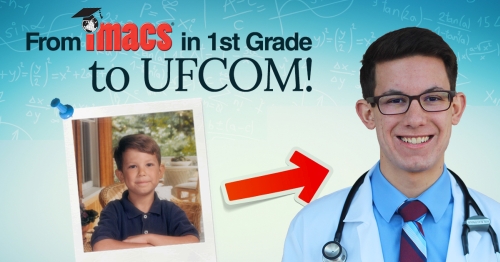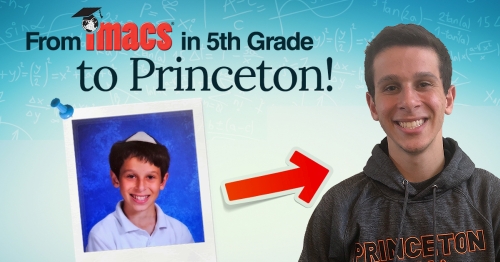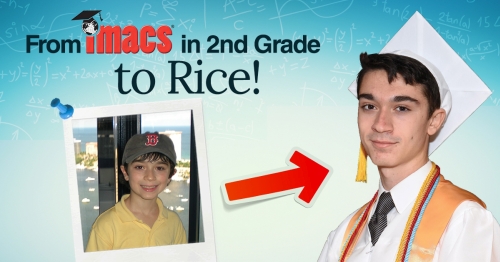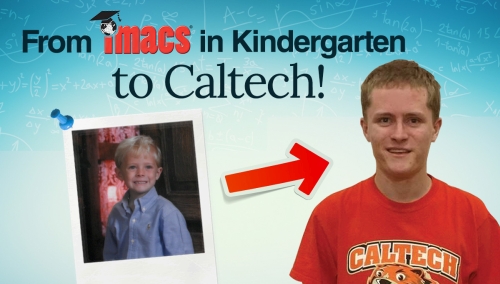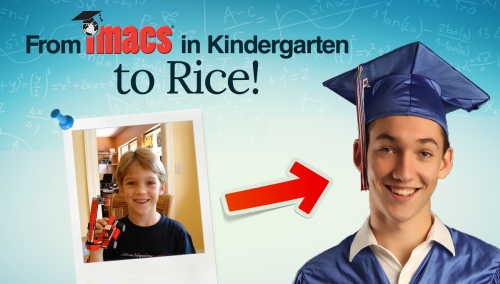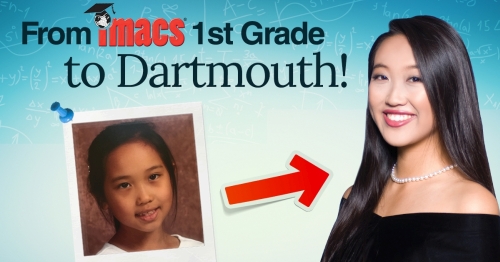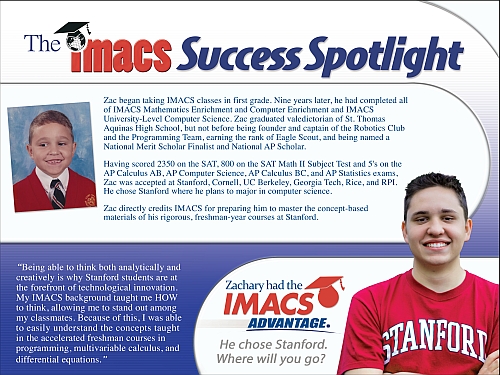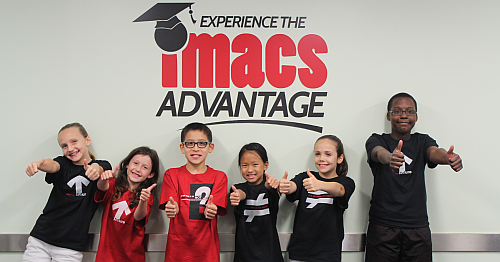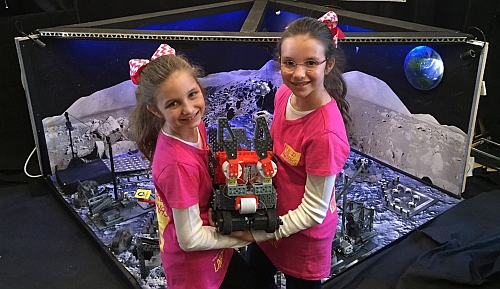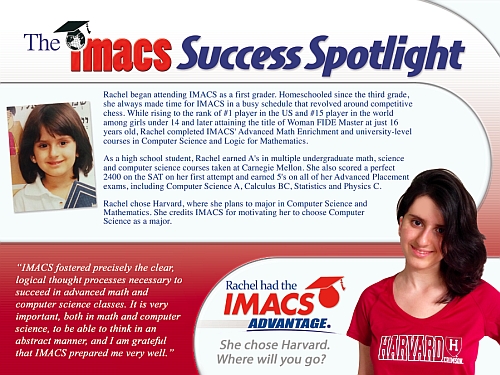
Nik attended IMACS from 1st through 12th grade and completed Math Enrichment, Computer Enrichment, Hi-Tech Summer Camp, and university-level courses in Computer Science and Logic for Mathematics. He earned straight A’s in high school, scored 790 on the math section of the SAT, and was named a National AP Scholar after scoring 5’s on 13 AP exams. He also happens to be a virtuoso pianist.
Nik chose the University of Florida’s Honors Program where he was selected as a Stamps Scholar in recognition of his exceptional success in leadership, service, and academics. As an undergraduate in UF’s Biomedical Engineering program, he completed research in both biomedical engineering and gastroenterology while maintaining a perfect 4.0 GPA.
Nik was accepted into the UF College of Medicine’s highly selective Medical Honors Program. In only his first year of medical school, he served as the Operations Coordinator for Gainesville’s Equal Access Clinic, the largest free clinic in the country run entirely by medical students. Nik will earn both his B.S. and M.D. degrees in seven years after which he plans to complete his residency in internal medicine and then specialize in cardiology.
“Logical reasoning and critical thinking are applicable both within and outside of mathematics. As a medical student, I use these skills every day to efficiently diagnose and effectively treat patients. I credit my many years at IMACS for growing these skills to their fullest potential.”
Congratulations, Nik!
Ty started taking IMACS Math Enrichment classes in 5th grade and went on to complete IMACS’ university-level courses in Computer Science and Logic for Mathematics. Ty cultivated a love for problem-solving and analytical thinking in high school, greatly enjoying AP Mathematics and Physics courses while applying those skills to creative outlets such as the advanced study of the Talmud (Jewish Oral Law).
As a student-athlete, Ty was a leader in the classroom and on the field. He and his teammates won the Technion’s 2017 Rube Goldberg Machine Challenge, an international competition, for which they were awarded one-year full scholarships. Ty’s pioneering performance in an independent course on Multivariable Calculus led his high school to establish a program allowing highly advanced students to study this challenging subject. A varsity soccer player for four years, Ty won MVP honors in 11th and 12th grade and was named a captain of the team in his senior year.
Ty was accepted early decision to Princeton University where he will major in Operations Research and Financial Engineering after taking a gap year to study abroad.
“IMACS taught me to simultaneously think critically and creatively, imbuing me with skills that assisted me throughout high school and played a fundamental role in my decision to pursue data analysis at Princeton University.â€
Congratulations, Ty!
Ricky first attended IMACS in 2nd grade. Over the next 10 years he completed all levels of Math Enrichment and Computer Enrichment, Electronics, and university-level classes in Computer Science and Logic for Mathematics. Having scored 1580 on the SAT, 35 on the ACT, 800 on the SAT II subject tests in Math and Chemistry, and 5’s on AP exams in Calculus AB, Calculus BC and Chemistry, Ricky was named a National Merit Finalist and National AP Scholar.
During high school, Ricky channeled his talents and sharp focus through both academic and athletic endeavors. He qualified for the prestigious American Invitational Mathematics Examination, and he and his teammates competed in the Barry University Olympiad tournaments, earning 1st place team wins in Math and Chemistry. Ricky also works on developing ways to use computer programming to enhance research, as well as striving to improve his personal best times in track and cross-country.
Ricky was accepted at Rice University, University of Florida, University of Miami with a Singer Scholarship, and University of Southern California with a Presidential Scholarship. He chose Rice where he will major in Computational and Applied Mathematics followed by a Ph.D. and career in research.
“Taking IMACS classes from a young age gave me a clear advantage in math and computer science, but it also helped me excel in all other fields. I am able to approach complex problems with confidence because of what I learned at IMACS.”
Congratulations, Ricky!
RJ was an IMACS student from kindergarten through 12th grade and took every class IMACS offered, including all levels of Math Enrichment, Computer Enrichment, Hi-Tech Summer Camp, University-Level Computer Science, AP Computer Science: Java Programming, and University-Level Logic for Mathematics.
With a 5.9 GPA and 2360 on the SAT, RJ graduated as co-valedictorian and was honored as a US Presidential Scholar candidate, National AP Scholar and National Merit Scholar. He and his teammates were also four-time Science Olympiad state champions.
RJ was accepted to Caltech, Georgia Tech, Carnegie Mellon, and the University of Florida. He chose Caltech where he took junior-level Computer Science classes as a freshman and served as a Teaching Assistant for those classes as a sophomore. RJ conducted summer research in computer vision and was selected for an internship at Northrup Grumman. He will graduate with a double major in Computer Science and Philosophy and plans to attend graduate school to specialize in Machine Learning.
“IMACS taught me an organic approach to problem-solving, a way of thinking that demonstrates the necessary rigor required to solve genuinely challenging problems. The introduction to proofs and logic that I got at IMACS was absolutely critical to my success at Caltech.”
Congratulations, RJ!
RJ Antonello
As a young child, Mason excelled in IMACS Math Enrichment classes and, in subsequent years, attended several weeks of IMACS summer camps. He later completed IMACS’ university-level courses in Computer Science and Logic for Mathematics. Mason was honored by the College Board’s National Hispanic Recognition Program for his achievement on the PSAT/NMSQT, and his high school mathematical modeling team was recognized by the Consortium for Mathematics and its Applications. Mason graduated high school with a perfect 4.0 GPA and 34 on the ACT.
A natural at sharing knowledge, Mason enjoys tutoring students in science and math at a local homeschool co-op, co-taught a robotics class for two years, and was a Teaching Assistant for an Honors Calculus seminar. He accomplished this and more while being an all-county varsity and travel soccer player and a dual-enrolled student at a regional 4-year university.
Mason chose Rice University where, at 16 years old, he was accepted early decision into the George R. Brown School of Engineering. He plans to major in Materials Science and NanoEngineering.
“My early exposure to IMACS provided me with a unique foundation in logic and mathematics that helped me succeed in advanced STEM classes at a very early age. I understand numbers intuitively and am able to solve complex problems in my head thanks to my IMACS training.”
Congratulations, Mason!
Snow began IMACS in 1st grade and completed all levels of IMACS Math Enrichment. She returned during high school to complete the IMACS University Computer Science track. Snow’s talents and keen interest in programming, civics, and service propelled her to 1st place finishes at FIU’s Google Startup Competition, Ft. Lauderdale’s Code for America Civic Hackathon, JusticeHack Miami, and Yale’s Bulldog Invitational Mock Trial Competition.
In addition to being selected as a National Merit Finalist, Snow was named Cadet of the Year by the Florida Wing of the Civil Air Patrol and won 1st Place at the National Cadet Special Acts Competition. Snow credits IMACS for the way she thinks and approaches every aspect of her life.
With a 5.5 GPA, 1580 out of 1600 on the SAT, and 800 on the SAT Math II exam, Snow was accepted at Dartmouth, UC Berkeley, NYU, Vanderbilt, Wellesley, and the University of Miami. She chose Dartmouth where she plans to double major in Computer Science and Economics and eventually pursue a career in cyberlaw or cybersecurity.
“IMACS is the one place that doesn’t teach you steps to get to a specific solution but rather how to use logical and creative thinking to develop your own solution. It is the embodiment of everything learning should be.”
Congratulations, Snow!
who is beginning his sophomore year at Stanford.
Zac began taking IMACS classes in first grade. Nine years later, he had completed all of IMACS Mathematics Enrichment and Computer Enrichment and IMACS University-Level Computer Science. Zac graduated valedictorian of St. Thomas Aquinas High School, but not before being founder and captain of the Robotics Club and the Programming Team, earning the rank of Eagle Scout, and being named a National Merit Scholar Finalist and National AP Scholar.
Having scored 2350 on the SAT, 800 on the SAT Math II Subject Test and 5’s on the AP Calculus AB, AP Computer Science, AP Calculus BC, and AP Statistics exams, Zac was accepted at Stanford, Cornell, UC Berkeley, Georgia Tech, Rice, and RPI. He chose Stanford where he plans to major in computer science.
Zac directly credits IMACS for preparing him to master the concept-based materials of his rigorous, freshman-year courses at Stanford.
“Being able to think both analytically and creatively is why Stanford students are at the forefront of technological innovation. My IMACS background taught me HOW to think, allowing me to stand out among my classmates. Because of this, I was able to easily understand the concepts taught in the accelerated freshman courses in programming, multivariable calculus, and differential equations.”
—Keith Devlin, Professor of Mathematics, Stanford University
Several of our Math Enrichment parents have asked why IMACS wasn’t mentioned in The Atlantic’s recent article entitled "The Math Revolution". Well, we’re the first to admit that we’re not sexy! To journalists, that is. Or rather what we do isn’t sexy, especially when compared to the panache of producing math competition winners. But we believe in what we do, which is more than just math. IMACS prepares children to be better thinkers for life. And after twenty-three years of seeing our approach succeed, we wouldn’t change for all the media coverage in the world.
For readers unfamiliar with IMACS, we specialize in mathematics and computer science for bright, talented and gifted K-12 students. The core of our program is our Mathematics Enrichment curriculum for elementary school students, which is taught at 29 locations throughout the US. IMACS Math Enrichment is unique in that it is intentionally designed to be completely different from school math. One might say it’s "mathematician" math because it teaches even our youngest students about beautiful and powerful mathematical structures studied by professional mathematicians and typically not introduced until college.
Why do we take this approach instead of starting with what kids have already seen and expanding on it? (It sure would be a lot easier on us to market curriculum that parents recognize and that journalists think they can write about!) This goes back to the overarching purpose of everything we do — making better thinkers for life. We’re not just about turning good math students into even better ones, although we do that. We’re not just about providing gifted students with an outlet for their creative mathematical thinking, although we do that a lot. We’re not just about teaching problem-solving skills, although we certainly do that. IMACS is about teaching children how to think in creative, logical and flexible ways that will benefit them throughout their lives, whether within or outside the mathematical arena. We equip them so that, long after they have left our classrooms and entered into the "real world", they will be able to react intelligently and constructively to problems and situations that no one alive today has even imagined.
How do you learn to face those kinds of novel situations? Not by working on problems that look familiar. As IMACS alumnus Zachary Kaufman put it, "Graduate school at Stanford was so much easier with the logical thinking skills I learned at IMACS. While classmates tried to memorize each type of problem, I was able to strongly grasp core concepts and use them to solve any problem, even if it was different from those I had seen." Zachary is a better thinker for life. Or alumna Rachel Cuozzo: "An MIT degree says to the world that you are capable of complex problem solving and abstract thinking. IMACS gave me a jumpstart on my MIT education, as it taught me to exercise the same parts of my mind that I use now on a daily basis." Rachel is a better thinker for life. This is what IMACS is about. Unfortunately, it doesn’t always make good copy in an article about math whizzes.
Furthermore, IMACS has never been only for kids who already excel at math or families seeking a challenging math education for their gifted children. Of course, the majority of our students are very mathematically talented, and they happily attend our Math Enrichment classes or take our online math courses. But IMACS also nurtures bright students with untapped abilities whose prior negative experiences turned them away from math. Usually, they have been misled into thinking that being good at math means calculating quickly, scoring high on standardized math tests, or enjoying math competitions. For many talented students, none of those apply. IMACS is able to take those kids — who often have natural talent for math expressed in other ways, such as a love for games, puzzles and patterns — and show them (1) what it means to be genuinely good at math and (2) how incredibly good at math they truly are. IMACS makes them, too, better thinkers for life.
So if you are a current IMACS parent wondering if you’re missing out on something, or if you are a prospective parent considering IMACS, we encourage you to confirm that the math enrichment providers you are considering actually live up to their claims. Some will tell you that they go beyond what schools do. Some will tell you that they don’t do "drill and kill". Verify for yourself. Ask to observe a class and to see samples of the curriculum. Does it look familiar? Is it largely similar to what schools already teach? That will tell you a lot about whether your child’s mind is going to be expanded as much and in ways that you’re hoping for and quite possibly paying for.
You might recognize twin sisters Hadley and Delaney Robertson from their cooking show for kids, Twice as Good, that airs on PBS stations across the country. We at IMACS also have the pleasure of knowing them as two intelligent and delightful students who have been attending our Math Enrichment classes since they were in kindergarten. "IMACS has provided Hadley and Delaney with such an amazing mathematical foundation," their father, Johnathan, recently shared with us. And we are beyond thrilled to share that these talented girls were just named grand prize winners in the 2015 MOONBOTS Challenge!
The international MOONBOTS competition, also known as the "Google Lunar XPRIZE for Kids," is designed to encourage the next generation of space explorers and innovators. Kids ages 8-17 are invited to design, create and program their own lunar rover, based on a legend or theory that inspires them about the moon. This year 235 teams from 29 countries entered the competition, and the Linked Lunas team comprised of Hadley and Delaney won! As grand prize winners, they will travel to Japan to meet the Google Lunar XPRIZE teams that are competing to land a privately funded robot on the moon.
Hadley and Delaney have long been fascinated by the moon. When they were younger, their grandfather would regale them with a story of how the Earth once had two moons, which the sisters imagined were twins like themselves. They later discovered that planetary scientist Professor Erik Ausphaug theorized that the Earth, indeed, used to have two moons that eventually collided and merged to form the moon that we see today. This mythical tale and scientific theory inspired in Hadley and Delaney a deep interest in the moon and thoughts on how the same moon appears differently depending on one’s perspective. They share their inspiration in this clever entry video:
With a captivating presentation like that, it's no wonder that Linked Lunas was one of only 30 teams to move on to the technically challenging second phase of the competition. During the second round, Hadley and Delaney put their engineering, programming, and creative problem-solving skills to work in designing and building a lunar landscape, building and programming a sophisticated robot, and developing a game for their robot to rove the lunar landscape. Not bad for a pair of 9-year-olds! You can’t help but be impressed by their masterful moon mission in this next video:
The MOONBOTS Challenge, however, isn't only about individual achievement. An important component of the competition is how teams use their innovative projects to inspire members of their community through public outreach. Team Linked Lunas was able to secure donations of robotics kits and $5,000 for after-school robotics instruction at a local, underserved middle school. In this last video, Hadley and Delaney give a demonstration of their robot to students from that school and announce the exciting news of the donations to their school:
Everyone at IMACS is so proud of these remarkable girls. There is no doubt that Hadley and Delaney have a talent for math and science and love inspiring others to learn. The cooking show Twice as Good has produced 20 fun videos that explain how cooking can teach kids about nutrition as well as science, math, and geography. Share these with your children and maybe they, too, will be encouraged to shoot for the moon!
Rachel began attending IMACS as a first grader. Homeschooled since third grade, she has always made time for IMACS in a busy schedule that revolved around competitive chess. While rising to the rank of #1 player in the US and #15 player in the world among girls under 14 and later attaining the title of Woman FIDE Master at just 16 years old, Rachel completed IMACS’ Advanced Math Enrichment and university-level courses in Computer Science and Logic for Mathematics.
As a high school student, Rachel earned A’s in multiple undergraduate math, science and computer science courses taken at Carnegie Mellon. She also scored a perfect 2400 on the SAT on her first attempt and earned 5’s on all of her Advanced Placement exams, including Computer Science A, Calculus BC, Statistics and Physics C.
Rachel chose Harvard, where she plans to major in Computer Science and Mathematics. She credits IMACS for motivating her to choose Computer Science as a major.
“IMACS fostered precisely the clear, logical thought processes necessary to succeed in advanced math and computer science classes. It is very important, both in math and computer science, to be able to think in an abstract manner, and I am grateful that IMACS prepared me very well.”
Related Blog Posts:
Older Posts »







